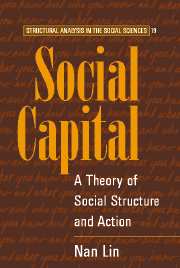Book contents
- Frontmatter
- Contents
- Preface
- Part I Theory and Research
- Part II Conceptual Extensions
- 8 Social Capital and the Emergence of Social Structure
- 9 Reputation and Social Capital
- 10 Social Capital in Hierarchical Structures
- 11 Institutions, Networks, and Capital Building
- 12 Cybernetworks and the Global Village
- Part III Epilogue
- References
- Index
9 - Reputation and Social Capital
The Rational Basis for Social Exchange
Published online by Cambridge University Press: 05 June 2012
- Frontmatter
- Contents
- Preface
- Part I Theory and Research
- Part II Conceptual Extensions
- 8 Social Capital and the Emergence of Social Structure
- 9 Reputation and Social Capital
- 10 Social Capital in Hierarchical Structures
- 11 Institutions, Networks, and Capital Building
- 12 Cybernetworks and the Global Village
- Part III Epilogue
- References
- Index
Summary
This chapter continues the dialogue on action and social structure initiated in the previous chapter. As has been pointed out, the multiplicity and complexity of routinized social relations in a collectivity demand increasing rules of recognition and legitimation that recognize the basic right to human capital (property) while at the same time specifying responsibilities and obligations for actors contributing resources. Thus, recognition was also suggested as an important process for individual actors overcoming possible costs to unequal exchanges – why someone higher in social position and richer in resources would be engaged in repeated exchanges with someone lower in social position and poorer in resources. How this process operates at the interactional level has not been articulated. What needs to be understood is that unequal transactions in exchanges can and do occur because there are payoffs for the actors who give more resources than they receive and why this is somewhat related to recognition. This chapter will focus on this issue. I will set aside the legitimation issue and concentrate on the social process of recognition and its significance in exchange – a process of repeated interactions between actors and the fundamental building block of a collectivity.
Exchange: Social and Economic Elements
Exchange, a central concept in sociological analysis, can be defined as a series of interactions between two (or more) actors in which a transaction of resources takes place.
- Type
- Chapter
- Information
- Social CapitalA Theory of Social Structure and Action, pp. 143 - 164Publisher: Cambridge University PressPrint publication year: 2001
- 2
- Cited by

